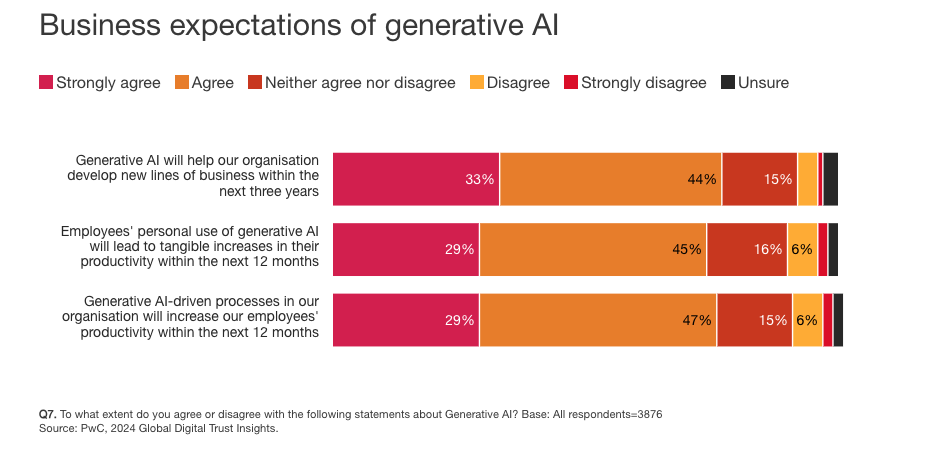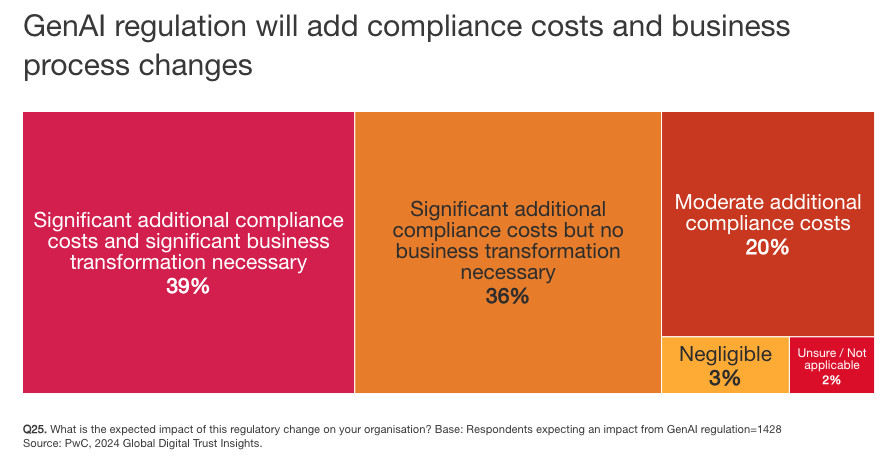Global Digital Trust Insights 2024:
Cybersecurity and Generative AI
Global Digital Trust Insights 2024 de PwC 26th edition, highlights an emerging trend in the cybersecurity landscape: the increasing integration of Generative Artificial Intelligence (GenAI) into cyber defense strategies. With over 3,800 surveyed executives, the report reveals how organizations are pivoting towards disruptive innovations in cybersecurity.
The Impact of Generative AI on Cyber Defense
Approximately 69% of senior executives plan to incorporate GenAI into their cybersecurity tactics in the coming year, underscoring the growing trend of integrating advanced AI in defense against digital threats.
This shift promises to revolutionize how we address digital risks. However, it comes with its set of challenges, including a potential increase in cyber threats and the need for effective AI governance.
_____________________________________________________________________________________________________________
Risk and Opportunities of GenAI in Cybersecurity
While 19% of respondents express reservations about using GenAI without proper governance policies, the majority sees GenAI as an opportunity to transform cyber defense. About 52% of respondents anticipate that GenAI usage will generate high-impact cyber attacks in the next 12 months, highlighting concerns about the technology’s potential to facilitate large-scale attacks.
GenAI applications, from threat detection to generating cyber risk reports, promise increased efficiency and a better understanding of threats. Companies seeking to capitalize on GenAI advantages must also consider associated risks. Privacy, regulatory compliance, and data management are critical aspects that must be addressed to ensure ethical and effective use of GenAI in cybersecurity.
_____________________________________________________________________________________________________________
Promising Applications of GenAI in Cyber Defense
The most promising areas of GenAI application include threat detection and tracking, cyber risk reporting, and updating control measures. These applications can provide companies with the necessary tools to respond agilely to emerging threats.

Generative Artificial Intelligence vs. Talent Shortage
The study indicates that 39% of CISOs, CIOs, and CTOs consider staff turnover a growing problem, with an additional 15% seeing it as a hindrance to cybersecurity goals. This suggests that GenAI could help alleviate the shortage of specialized talent.
The implementation of GenAI could also be a solution to the shortage of cybersecurity talent, freeing professionals from routine tasks and allowing them to focus on more strategic and creative aspects of digital security.

Regulations and Ethics in GenAI Use
With the increasing use of GenAI, organizations must be prepared for regulatory and ethical implications. It is crucial to adopt a responsible and transparent approach to GenAI use to ensure regulatory compliance and maintain public trust. Among the respondents, 37% anticipate significant AI-related regulations, with three-quarters of them believing that compliance costs will be considerable.
Sixty-three percent of respondents are comfortable deploying GenAI tools in their companies without internal controls on data quality and governance, while 77% state their intention to use GenAI ethically and responsibly.
Conclusions and Future Perspectives
In conclusion, the Global Digital Trust Insights 2024 report highlights the growing importance of generative AI in cybersecurity. While organizations face challenges in terms of risks and regulations, the adoption of GenAI represents a significant opportunity to strengthen digital defense and promote secure innovation.
